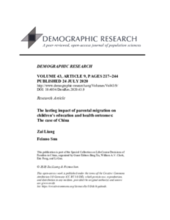Displaying 51 - 60 of 195
For this study, the authors conducted the first nationwide survey to examine whether left-behind children aged 0–6 years old have poor interactions with primary caregivers, and whether school-age children experience higher levels of victimization and emotional distress than their non-left-behind counterparts.
This study aimed to systematically review experimental studies of interventions that promote mental health wellbeing of left-behind children (LBC) in mainland China.
The current study aimed to clarify the relationship between stressful life events and delinquency among left-behind adolescents by examining the moderating roles of resilience and separation duration in this process.
Informed by the family systems theory and the ecological view of well-being, this study aimed to investigate how grandparent–child dyads show reciprocal associations between relationship quality and subjective well-being (SWB) and the extent to which resilience accounts for such reciprocal associations.
Capitalizing on a unique survey in China, the authors of this article aim to study the lasting educational and health consequences of parental migration on children.
This study examined rural children’s well-being, particularly their physical well-being, as functions of parental absence, family economic status, and neighborhood environment.
This study examines how childhood experiences of being left behind by migrant parents affect the behaviors of adults.
To explore the complex dynamics of parental migration on nonsuicidal self‐injury (NSSI), this study examined the roles of parent–child cohesion and socioeconomic status (SES) in the relationship between stressful life events and NSSI.
The purpose of this study was to examine the mental health status and substance use behaviors of urban left-behind children and urban children still living with their parents in comparison to rural left-behind children.
This study explored the independent effects of left-behind experience (LBE) on self-esteem and aggressive behavior in Chinese young adult populations, or the interaction effects of LBE and self-esteem on aggressive behavior.

